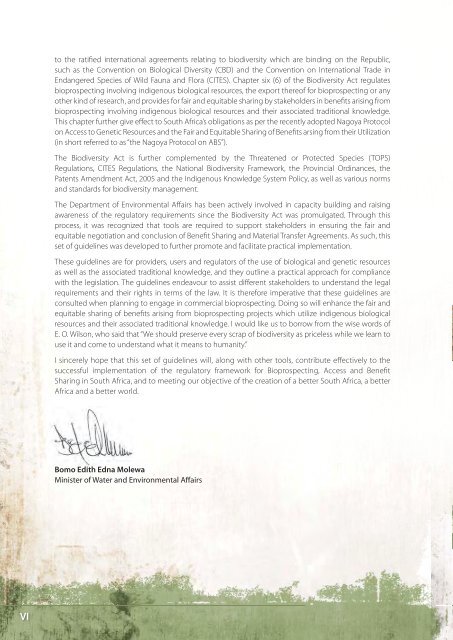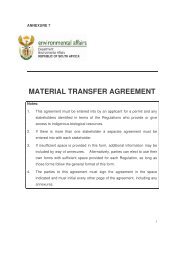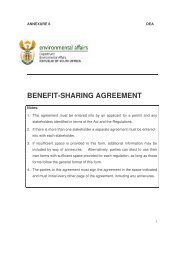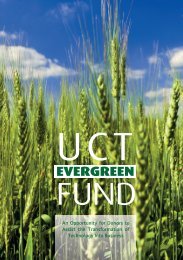South Africa's Bioprospecting, Access and Benefit-Sharing ...
South Africa's Bioprospecting, Access and Benefit-Sharing ...
South Africa's Bioprospecting, Access and Benefit-Sharing ...
Create successful ePaper yourself
Turn your PDF publications into a flip-book with our unique Google optimized e-Paper software.
to the ratified international agreements relating to biodiversity which are binding on the Republic,<br />
such as the Convention on Biological Diversity (CBD) <strong>and</strong> the Convention on International Trade in<br />
Endangered Species of Wild Fauna <strong>and</strong> Flora (CITES). Chapter six (6) of the Biodiversity Act regulates<br />
bioprospecting involving indigenous biological resources, the export thereof for bioprospecting or any<br />
other kind of research, <strong>and</strong> provides for fair <strong>and</strong> equitable sharing by stakeholders in benefits arising from<br />
bioprospecting involving indigenous biological resources <strong>and</strong> their associated traditional knowledge.<br />
This chapter further give effect to <strong>South</strong> Africa’s obligations as per the recently adopted Nagoya Protocol<br />
on <strong>Access</strong> to Genetic Resources <strong>and</strong> the Fair <strong>and</strong> Equitable <strong>Sharing</strong> of <strong>Benefit</strong>s arsing from their Utilization<br />
(in short referred to as “the Nagoya Protocol on ABS”).<br />
The Biodiversity Act is further complemented by the Threatened or Protected Species (TOPS)<br />
Regulations, CITES Regulations, the National Biodiversity Framework, the Provincial Ordinances, the<br />
Patents Amendment Act, 2005 <strong>and</strong> the Indigenous Knowledge System Policy, as well as various norms<br />
<strong>and</strong> st<strong>and</strong>ards for biodiversity management.<br />
The Department of Environmental Affairs has been actively involved in capacity building <strong>and</strong> raising<br />
awareness of the regulatory requirements since the Biodiversity Act was promulgated. Through this<br />
process, it was recognized that tools are required to support stakeholders in ensuring the fair <strong>and</strong><br />
equitable negotiation <strong>and</strong> conclusion of <strong>Benefit</strong> <strong>Sharing</strong> <strong>and</strong> Material Transfer Agreements. As such, this<br />
set of guidelines was developed to further promote <strong>and</strong> facilitate practical implementation.<br />
These guidelines are for providers, users <strong>and</strong> regulators of the use of biological <strong>and</strong> genetic resources<br />
as well as the associated traditional knowledge, <strong>and</strong> they outline a practical approach for compliance<br />
with the legislation. The guidelines endeavour to assist different stakeholders to underst<strong>and</strong> the legal<br />
requirements <strong>and</strong> their rights in terms of the law. It is therefore imperative that these guidelines are<br />
consulted when planning to engage in commercial bioprospecting. Doing so will enhance the fair <strong>and</strong><br />
equitable sharing of benefits arising from bioprospecting projects which utilize indigenous biological<br />
resources <strong>and</strong> their associated traditional knowledge. I would like us to borrow from the wise words of<br />
E. O. Wilson, who said that “We should preserve every scrap of biodiversity as priceless while we learn to<br />
use it <strong>and</strong> come to underst<strong>and</strong> what it means to humanity.”<br />
I sincerely hope that this set of guidelines will, along with other tools, contribute effectively to the<br />
successful implementation of the regulatory framework for <strong>Bioprospecting</strong>, <strong>Access</strong> <strong>and</strong> <strong>Benefit</strong><br />
<strong>Sharing</strong> in <strong>South</strong> Africa, <strong>and</strong> to meeting our objective of the creation of a better <strong>South</strong> Africa, a better<br />
Africa <strong>and</strong> a better world.<br />
Bomo Edith Edna Molewa<br />
Minister of Water <strong>and</strong> Environmental Affairs<br />
VI






![Innovation at UCT 2010 [Report] - Research Contracts & IP Services](https://img.yumpu.com/28928393/1/184x260/innovation-at-uct-2010-report-research-contracts-ip-services.jpg?quality=85)